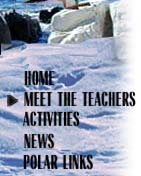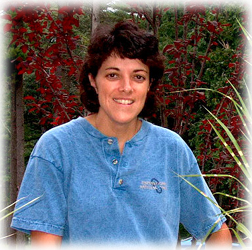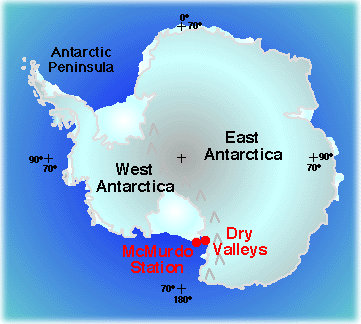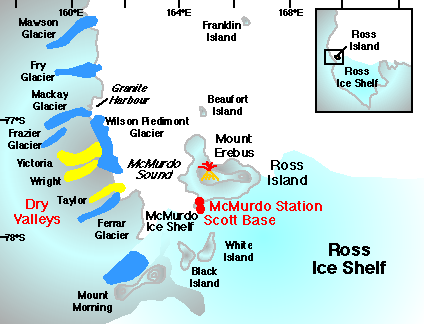
|
|
 
Send mail to Mary Ann at:
Mary Ann will be working in remote field camps while she is in Antarctica. This means that communications will be intermittant and Mary Ann may not be able to respond to emails right away.

Greetings from Massachusetts! Land of clam "chowda", Boston baked beans, and the Red Sox!
I am currently a teacher and Curriculum Coordinator at the John W. Rogers Middle School in Rockland located between Boston and Cape Cod. There are approximately 700 students in our school, grades 5-7. I have spent my career in this system teaching a variety of science courses in grades 5-12 including Earth Science, Physical Science, Human Physiology, and Science Technology. I love teaching science because there is so much of nature and our universe left to explore, to investigate, to discuss, and to debate. Our school district continually provides learning opportunities and encouragement to teachers. Now, with their enthusiastic support, I am on my way to Antarctica!
Like many educators, I have parcticipated in numerous professional development programs. Many of these activities have had a lasting impression on me; for example, Space Camp for Educators, studying whales off Cape Cod, attendance at twelve NSTA National Conventions, and most recently NASA's Teacher Academy Program at the National Space Biomedical Research Institute in Texas. I have learned a great deal from fellow teachers across the country and now I look forward to sharing my Antarctic adventure with them.
Over the years, many exciting personal experiences have increased my fascination with science and my enthusiasm for teaching. In 1994 I flew my first solo flight in a Cessna over the cranberry bogs of America's hometown of Plymouth. Learning to fly was an incredibly enriching event that I have transferred to my classroom to motivate and inspire my students. I have also traveled extensively to such places as Morocco, several Caribbean Islands, the Yukon Territory, Alaska, and much of the rest of the United States including many national parks. Some of my greatest experiences were spent backpacking through Europe during two summers. I learned so much about history, cultures, traditions, and people - truly fascinating! Traveling is my passion and I hope to visit every continent during my lifetime.
When I'm not teaching, I enjoy hiking, camping, kayaking, nature, and gardening.
So why Antarctica? As President Kennedy said (referring to the moon), "because it is there". Our polar regions still have so much to teach us about the past and future of our planet. I am thrilled to be an active parcticipant in the research being conducted in Antarctica, excited about the knowledge that I will gain, and I look forward to sharing my adventure with students and teachers.
Millennial Scale Fluctuations of Dry Valley Lakes: A Test of Regional Climate Variability and the Interhemispheric (A)Synchrony
Dr. Brenda Hall, Principal Investigator University of Maine, Orono, Maine
Tom Whittaker, graduate student
Amber Hawkins, field assistant
Sean Birkel, graduate student
Aaron Schlosser, field assistant
Chris Hendy, Co-Principal Investigator, University of Waikato, New Zealand
Sarah Millicich, graduate student
Jacob Croall, graduate student
Dr. Glenn Berger, Co-Principal Investigator
Desert Research Institute, Reno, Nevada
I will be conducting research with Dr. Brenda Hall and her team, along with Chris Hendy from the University of Waikato. Our research will ultimately focus on the question of synchrony or asynchrony of global climate change. Put simply, are changes in climate occurring at the same time in the Northern Hemisphere and Southern Hemisphere or are they occurring at different times? Do changes in deep-ocean circulation that affect the climate of the North Atlantic Region impact the climate of the Antarctic region and vice-versa? To address this question, climate data from various locations in both hemispheres must be collected and analyzed. Our attention will be given to a region of Antarctica known as the Dry Valleys where we will collect data from closed-basin lakes. Lake levels in the Dry Valleys of Antarctica have been significantly larger in the past, thirty to forty times larger than they are now. The change in these lake levels has occurred quite rapidly, within a period of 500 years or less from lowstand to highstand, which in geological time is very rapid. By studying the Dry Valley lakes, the team hopes to obtain data that will provide a history of rapid climate changes in the region that will then be used in conjunction with data from Northern Hemisphere studies to better understand global climate change. Where are we going?
The team will travel via helicopter from McMurdo Station to the Dry Valleys Region along the Southern Scott Coast of Antarctica. Our first camp in the Dry Valleys, a region that has received very little precipitation in millions of years, will be established at Lake Fryxell. From there, we will travel inland through Taylor Valley towards the two sections of Lake Bonney (east and west), and then on to Lake Joyce. If time permits, our last research camp will be located at Lake Vanda in nearby Wright Valley. The Research:
We will be using augers to bore through the ice to obtain sediment core samples from the lake bottoms. A piston-coring method will be used to push a four-inch diameter pipe into the mud to obtain sediment cores. These lake sediment cores will provide researchers with a history of previous water level changes. As an example, a core depth of two meters would represent 20,000 years in time. By studying the volume of the lakes, scientists can then relate lake levels to climate changes, and answer questions regarding the amount of melt water that occurred during a given period. Climate changes in some places have been quite rapid, taking perhaps only 5-10 years. In fact, the last major ice age may have ended in only thirty-eight years, merely a blink in geological time. Once the sediment cores are removed, they will be carefully packaged and shipped from Antarctica to a laboratory to be studied. The contents will be examined to obtain estimates of hydrologic (water volume and content) change. Scientists will study grain size, stratigraphy, evaporite mineralogy, stable isotope and trace element chemistry, and diatom assemblage analysis. The cores will be chronologically matched with geomorphical records and Antarctic ice core and glacial records. U/Th, U/He, and 14C dating of carbonates, in conjunction with luminescence sediment dating, will determine this chronology of the cores. (Further explanations of these tests will be provided in journal entries.) Evaluation of the link between lake levels and climate will come from hydrological and energy-balance modeling, focusing on the relationship between modern lakes, glacial meltwater, and climate. When this segment of research is complete, there will be an Antarctic lake-level and paleoclimate data set extending back 30,000 years. This data set will then be compared to Dry Valley glacier records and to the Antarctic ice cores to address hypotheses regarding regional climate variability. Finally, the regional variability can then be studied in conjunction with other Southern Hemispheric and Northern Hemispheric records to assess inter-hemispheric synchrony or asynchrony of climate change. Summary For Students: - The research team will travel to the Dry Valleys of Antarctica.
- The team will visit five frozen lakes to drill through the ice to reach the sediment on the bottom.
- 1-3 meter cores of sediment will be removed from the lake bottom.
- Sediment cores will be sent to a laboratory for study to learn about the past climate in the region.
- Researchers will then compare the climate history of the Dry Valleys to that of other parts of Antarctica.
- Finally, the past climate of Antarctica will be compared with the history of climate in the Northern Hemisphere, to determine if there is a relationship between the climate in the Northern and Southern hemispheres.
I would like to extend my thanks to the following corporate sponsors:
Data Harvest for their generous support in donating scientific equipment to conduct experiments in the field, and for networking support in various countries.
Hewlett Packard for their sponsorship in donating technology devices to help support experiments and promote polar learning.
The North Face for their kind donation of outwear.
A special thank you to my personal trainer Mike Botelho of Fitness Innovation Technologies for making exercise so enjoyable!
My sincere gratitude to the Rockland Public Schools and the Community of Rockland for all their support and encouragement. Please visit my sponsorship journal page for a complete listing of local sponsors.
Polar Classroom Activities:
Ice Continent Encounter


 Mary Ann will be working at remote locations while in Antarctica and will not be able to post a journal everyday. Please keep checking for updates from the field! Mary Ann will be working at remote locations while in Antarctica and will not be able to post a journal everyday. Please keep checking for updates from the field!
27 February, 2003: Antarctic Fire Department
16 February, 2003:
15 February, 2003: Reflections - by Dr. Brenda Hall, Principal Investigator
13 February, 2003: Timing, Luck, and Persistence Yield Ice Time - by Aaron Schlosser
12 February, 2003: Reflections - by Amber T. Hawkins
11 February, 2003: Tomís Little Journal Installment
10 February, 2003: Sean's Trip Recollection Thingy
30 January, 2003: Frozen To The Core
28 January, 2003: Helicopters and Sling Loads
27 January, 2003: Hiking And Exploring Pearse Valley
26 January, 2003: Rock-hardÖ Not Always!
25 January, 2003: Journal Entries Resume... Lake Joyce at Pearse Valley
24 January, 2003: Hey, Hey Boo Boo... Where's The Pic-a-nic Basket!
23 January, 2003: Going RetroNote:
22 January, 2003: Thank You Chris Hendy!
21 January, 2003: The Ultimate Field Trip
20 January, 2003: Toto, We're Not In Kansas Anymore
19 January, 2003: Let It Snow!!!
18 January, 2003: A Day At Lake Bonney Camp - Part 2
17 January, 2003: A Day At Lake Bonney Camp - Part 1
16 January, 2003: Beautiful Summer Day
15 January, 2003: E-Mail Responses - A Continuation of Antarctic Information
14 January, 2003: Responses to E-Mails
13 January, 2003: Casing Crisis
12 January, 2003: Lake Bonney - Rock Collecting Near Sollas Glacier
11 January, 2003: Good-Bye to Lake Fryxell
10 January, 2003: 1/10/03 A Successful Last Day On Lake Fryxell
9 January, 2003: Avoiding The Fall Into Oblivion
8 January, 2003: Solo Trip to F6
7 January, 2003: Hot Finger Arrives On The Ice - Another Day At F6
6 January, 2003: Coring Problems, So Back To F6
5 January, 2003: Visit to F6 Camp
4 January, 2003: The Auger Team Bores Again
3 January, 2003: Let the Boring Begin
2 January, 2003: Day One in the Dry Valleys
1 January, 2003: New Yearís Day, Happy Camper School Continued, and Into the Dry Valleys!
31 December, 2002: New Yearís Eve and Happy Camper School
30 December, 2002: An Invitation to New Zealand's Scott Base
29 December, 2002: Ice Stock 2002
28 December, 2002: Preparations For Departure Into The Field
27 December, 2002: Off To The Ice
26 December, 2002: Clothing Distribution Center (CDC)
25 December, 2002: Christmas in New Zealand
23 December, 2002: The Adventure Begins!
20 December, 2002: Local Sponsorship
16 December, 2002: Grade One Jefferson School Flat Stanleys
11 August, 2001: TEA Teachers For 2002/2003
10 August, 2001: Quiz Answers
9 August, 2001: Safety in the Field
8 August, 2001: Into the Freezer .....
7 August, 2001: Being a Student at Orientation
6 August, 2001: Orientation Week
Return to top of page
|





 Mary Ann will be working at remote locations while in Antarctica and will not be able to post a journal everyday. Please keep checking for updates from the field!
Mary Ann will be working at remote locations while in Antarctica and will not be able to post a journal everyday. Please keep checking for updates from the field!

